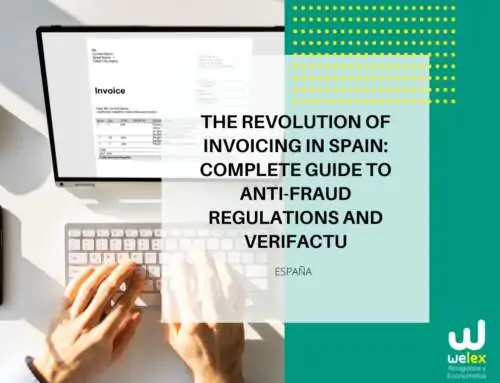In the Spanish business environment, the proper management of legal obligations is essential to avoid significant legal consequences. One such consequence, not always well known, is the possible transfer of liability for debts with the Social Security from the company to its directors. At Welex, a law and economics firm based in Marbella, we analyse this complex legal aspect and the circumstances under which such liability may arise.
Can a company’s liability be transferred to its directors in Spain?
Yes, in Spain, it is possible for the directors of a legal entity to be held liable for the company’s Social Security debts, either jointly or subsidiarily. This can occur if they fail to meet their legal obligations or if they act with negligence or bad faith.
The legal framework includes this possibility in various laws such as the Capital Companies Act, the General Social Security Law, the Insolvency Law and the General Regulation on Social Security Collection. In addition, similar principles apply as those set out in the General Tax Law.
Under what circumstances can liability be transferred to directors?
Liability can be transferred in several situations, including:
-
Failure to convene a meeting to dissolve the company or to file for insolvency when appropriate.
-
Acting against the law or the company’s articles of association.
-
Ceasing the company’s activity while leaving outstanding debts.
-
In the case of a declaration of culpable insolvency.
In these scenarios, the General Treasury of the Social Security may initiate a liability transfer procedure against the directors, even if the company is already undergoing insolvency proceedings.
Applicable legal framework in Spain
Below are the key regulations governing this matter:
-
-
Capital Companies Act (Royal Legislative Decree 1/2010):
-
Art. 236.1: Liability for unlawful or negligent acts.
-
Art. 367: Joint liability if no meeting is convened or insolvency is not filed.
-
-
Conclusion
The transfer of liability for Social Security debts in Spain is a legal tool that seeks to ensure compliance with business obligations. At Welex, based in Marbella, we advise administrators and companies on how to avoid situations that could lead to personal liability. Being well informed and acting in accordance with the law is essential to protect both the interests of the company and those of the administrator.
Relevant Case Law
Case law has confirmed and developed the legal assumptions regarding the transfer of liability, providing interpretations that specify the circumstances under which directors may be held liable for debts owed to Social Security.
Parties Responsible for Fulfilling the Obligation
The Judgment of the High Court of Justice of Castilla y León (Burgos), Contentious-Administrative Chamber No. 254/2019 of October 25, 2019 reaffirms that “those responsible for fulfilling the obligation to contribute and pay other Social Security resources are the natural or legal persons or entities without legal personality to whom the regulatory norms of each regime and resource directly impose the obligation of payment, as well as those who are jointly, subsidiarily or mortis causa successors of the former, due to acts, omissions, business dealings or legal acts that determine such liabilities.”
Administrative Decisions
Administrative rulings provide further interpretations regarding the assumptions of liability transfer:
The Decision No. 00/03322/2018/00/00 of the Central Economic-Administrative Court (TEAC), dated 27/02/2020 considers the subsidiary liability of directors for tax debts when “there is continuity in the business activity, and the repeated filing of self-assessments without payment of such tax items can be proven not to stem from a genuine intent to comply with the tax obligation covered by the self-assessment.”
The Decision No. 37/00754/2021/00/00 of the Regional Economic-Administrative Court (TEAR of Castilla y León), dated 31/10/2022 confirms the possibility of assigning tax debts to directors under Article 43.1.b) of the General Tax Law.
The Decision No. 30/02340/2018/00/00 of the Regional Economic-Administrative Court (TEAR of Murcia), dated 21/12/2020 outlines the requirements for subsidiary liability: “a) The de facto cessation of the legal entity’s activity while still having outstanding tax obligations; and b) The individual held the position of director at the time of cessation, extending liability to the pending tax obligations of the legal entity, except for penalties.”
The Decision of 5 February 2024 by the Directorate General of Legal Security and Public Faith recalls that, aside from insolvency proceedings, creditors “may initiate individual enforcement proceedings against the company and its shareholders, directors, or liquidators if the company’s non-payment of the debt is attributable to them, by exercising the individual action for liability.”
Analysis of the Grounds for Transfer of Liability
An analysis of the regulatory, case law, and doctrinal framework reveals several scenarios in which liability for debts to the Social Security system may be transferred:
1. Liability for Failing to Dissolve the Company or File for Insolvency Proceedings
The most common case of transferred liability is set out in Article 367 of the Spanish Companies Act, which imposes joint and several liability on directors who fail to call a general meeting to decide on the dissolution or to file for insolvency proceedings when the company is in a legal situation requiring its dissolution.
As confirmed by case law, especially the Judgment of the High Court of Justice (TSJ) of Andalusia (Málaga) No. 265/2020 and the Judgment of the TSJ of the Community of Madrid No. 589/2019, debts to the Social Security system are included among the “corporate obligations” referred to in this article.
This ground is particularly relevant in situations of insolvency or significant losses, where the company should either be dissolved or initiate insolvency proceedings but continues operating and accruing Social Security debts.
2. Liability for Acts Contrary to the Law or the Company’s Bylaws
Article 236.1 of the Spanish Companies Act establishes the general liability of directors for acts contrary to the law or the bylaws, or for breach of the duties inherent to their position, provided there is intent or negligence.
This allows for the transfer of liability when directors have acted negligently in managing Social Security obligations—for instance, by allocating funds to other payments instead of fulfilling these obligations, or by making unlawful decisions that led to the non-payment of contributions.
3. Liability in the Event of Cessation of Activity
As established by Article 43.1.b) of the General Tax Law—applicable by analogy—and confirmed by rulings such as Resolution No. 30/02340/2018/00/00 from the TEAR of Murcia, directors may be held secondarily liable for debts when the company ceases activity with outstanding obligations, provided they did not take necessary actions to ensure payment or took measures that resulted in non-payment.
This is especially relevant in cases of de facto company closure without proper liquidation procedures to ensure debt payments, including those owed to Social Security.
4. Liability in Insolvency Proceedings
In the context of insolvency, as established by the Insolvency Law and confirmed by decisions such as the Judgment of the TSJ of Castilla-León No. 77/2021, directors may be held liable when the insolvency is declared culpable and the estate is insufficient to cover all debts.
In such cases, the insolvency judge may order directors to cover the deficit in full or in part, including debts owed to the Social Security system.
5. Liability in Corporate Groups and Fraudulent Use of Legal Personality
As established by the Judgment of the High Court of Justice (TSJ) of Castilla y León No. 32/2023, when there is fraudulent use of legal personality or abuse of single management within corporate groups, joint and several liability for Social Security debts may be transferred.
This situation is relevant in cases involving corporate groups where assets or business activities are transferred between entities to avoid payment of debts.
Procedure for the Transfer of Liability
A relevant aspect in practice is the procedure to enforce the transfer of liability:
- Administrative route: As confirmed by judgments such as the TSJ of Castilla y León No. 77/2021, the General Treasury of the Social Security (TGSS) can declare joint and several liability through a transfer of liability resolution, without needing to resort to court proceedings. According to Article 34 of the General Social Security Law, the Labour and Social Security Inspectorate may issue reports against those jointly and severally liable.
- Insolvency proceedings: In insolvency situations, it is up to the insolvency administrators to bring liability actions against directors. However, as case law confirms, this does not prevent the TGSS from transferring liability through administrative channels in certain cases.
- Judicial route: As noted in the Resolution of February 5, 2024, by the Directorate-General for Legal Security and Public Faith, creditors, including the Social Security authority, may initiate proceedings against directors by exercising individual liability actions or revocatory or Paulian actions (actions to rescind fraudulent transfers).
Scope and Limits of Liability
Liability transferred to directors may take the following forms:
- Joint and several liability: As established in Article 367 of the Spanish Companies Act, when directors fail to fulfil their duties in situations requiring dissolution, or in cases of fraudulent use of legal personality.
- Subsidiary liability: As set out in Article 43 of the General Tax Law—applicable by analogy to Social Security debts—directors may be held subsidiarily liable, i.e., once the company’s insolvency has been established.
It is important to note that, according to Resolution No. 30/02340/2018/00/00 of the TEAR of Murcia, in cases of subsidiary liability due to cessation of activities, liability extends to outstanding tax obligations, excluding penalties.
Social Security Law Review. Laborum – Ediciones Laborum SL – David Montoya Medina – 2020-09-08
It is clear that among the “corporate obligations” referred to in Article 367 of the Spanish Companies Act (TRLSC), and which may therefore be subject to the joint and several liability of directors established by that provision, are the Social Security contributions owed by the company.
The excerpt indicates that Social Security contributions are considered “corporate obligations” under Article 367 of the TRLSC, and that directors may be held jointly and severally liable for these debts if they fail to fulfil their legal duties, such as convening a general meeting or initiating court-ordered dissolution in cases of insolvency.






Social Media